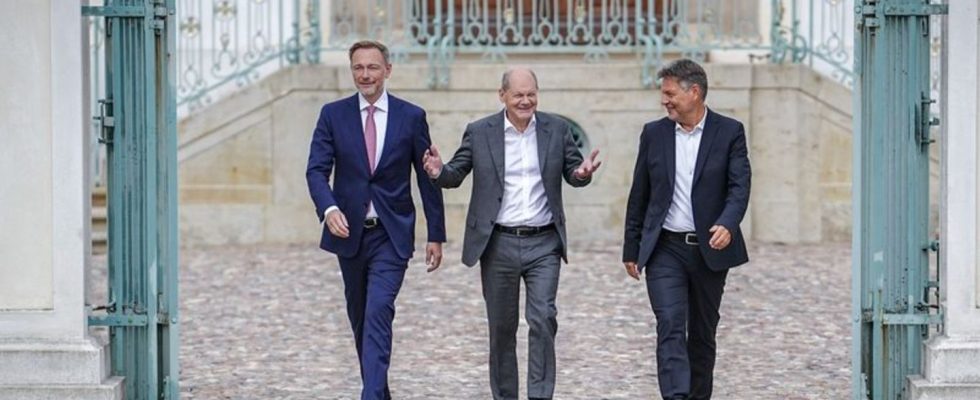retreat
The resolutions of the cabinet retreat in Meseberg
Finance Minister Christian Lindner, Federal Chancellor Olaf Scholz and Economics Minister Robert Habeck at the half-time retreat of the Federal Cabinet in Meseberg Castle. photo
© Kay Nietfeld/dpa
It crunches in the traffic light coalition. Nevertheless, the cabinet around Chancellor Scholz was able to agree on a few decisions at the half-time retreat at Meseberg Castle: Here is an overview.
The federal government is open for two days for the half-time retreat Schloss Meseberg near Berlin sat together – in view of the weak economic data, the focus was particularly on plans for economic development. At its meeting on Wednesday, the cabinet also passed other resolutions.
“Growth Opportunity Act”
50 tax policy measures should relieve the German economy by 32 billion euros in the coming years. The focus is on a premium for investments in climate protection. The draft law also contains new depreciation rules for residential buildings and opportunities for companies to offset losses more extensively for tax purposes. The tax system is also to be simplified through higher thresholds and lump sums.
reducing bureaucracy
Businesses and citizens should be freed from unnecessary bureaucracy. Among other things, the commercial and tax law retention periods for accounting documents are to be reduced from ten to eight years. In the future, hotels will no longer have to fill out a registration form for each individual guest. The cabinet decided on the cornerstones for a corresponding law, and a concrete draft is to be presented this year.
Digitization in healthcare
The federal government wants to introduce electronic prescriptions and digital health records across the board. By the beginning of 2024, e-prescriptions should be available for patients in all practices. At the beginning of 2025, e-patient files should come for everyone – unless you reject it. The use of combined health data for research is also to be made easier and significantly promoted.
Classification of Georgia and Moldova as “safe countries of origin”: With the inclusion of the two countries in the list of so-called safe countries of origin, asylum procedures for Georgians and Moldovans should be faster. In addition, they can be deported more easily if the outcome is negative.
Reform of the BND law
Among other things, the German foreign intelligence service should be better protected against espionage – including from its own employees. For this purpose, it should be possible to carry out checks on people, bags and vehicles without any suspicion. Private devices such as smartphones should also be able to be checked if there is a suspicion. The reform also implements the requirements of the Federal Constitutional Court. This involves restricting the transmission of personal data by intelligence services to the police and public prosecutor’s offices.
Data strategy of the federal government
In the next two years, the federal government wants to create the technical and legal requirements for the use of AI applications in administration. She also does not rule out the development of her own AI language models, which are referred to in technical jargon as Large Language Models (LLM). Another new feature of the data strategy is that the paper now contains a timeframe for the implementation of the plans for the first time. The timeline extends to the end of 2024.

